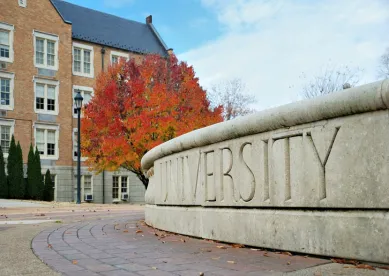On Friday, November 16, 2018, the Department of Education (DOE) released proposed Title IX regulations dictating the process by which colleges and universities must handle allegations of sexual misconduct.
Institutions of higher education have been in limbo since September 2017 when the DOE rescinded Obama-era guidance that called for hard-hitting enforcement of Title IX and issued interim guidance as a placeholder until they could engage in the formal rulemaking process. Today’s proposed regulations, if enacted, will take the place of the DOE’s September 2017 interim guidance. According to the DOE, the new regulations would substantially decrease the number of investigations into complaints of sexual misconduct and save institutions millions over the next decade.
Many of the new regulations deviate significantly from prior guidance. The most significant changes increase the discretion given to universities in crafting procedures for adjudicating Title IX claims within their institutions. The proposed guidance allows universities to choose the applicable evidentiary standard (either “preponderance of the evidence” or “clear and convincing evidence”) in determining responsibility, as long as it is consistent with the standard used in other student disciplinary matters. The new regulations also permit the use of informal resolution processes to resolve sexual misconduct allegations if the parties agree.
Other notable provisions of the proposed regulations include the following:
- The definition of “sexual harassment” has been more narrowly defined as “unwelcome conduct on the basis of sex that is so severe, pervasive and objectively offensive that it denies a person access to the school’s education program or activity.”
- For purposes of administrative enforcement, universities would be held to a “deliberately indifferent” standard. In other words, to avoid liability, a university with “actual knowledge” of sexual harassment need only respond in a manner that is not “deliberately indifferent.” An institution would be found deliberately indifferent “only if its response to sexual harassment is clearly unreasonable in light of the known circumstances.”
- “Actual knowledge” is defined in the proposed regulations as notice of sexual harassment or allegations of sexual harassment provided to an official of the institution “who has the authority to institute corrective measures on behalf of the [institution].” In contrast to prior guidance, this definition excludes most professors, administrators, and staff.
- Under the proposed regulations, universities would no longer be allowed to investigate allegations of sexual harassment that occurred off-campus.
- The proposed regulations would require universities to provide written notice to a respondent upon receipt of a complaint, which would include a statement that the responding party is presumed to be not responsible for the alleged conduct and that a determination of responsibility will be made at the end of the grievance process.
- Live fact-finding hearings would be mandatory for universities under the new regulations. Investigators would also be precluded from serving as factfinders. This would eliminate the use of the single investigator model currently used by many universities.
- Universities must permit cross-examination of any party or witness by the opposing party’s advisor, but not by the party him/herself. If a party or witness refuses to submit to cross-examination, that person’s testimony could not be relied on by the fact-finder. The party’s choice of advisor could not be limited by the institution of higher education.
- Religious institutions of higher education would no longer be required to seek assurances of exemption from Title IX regulations in advance of a DOE investigation. Under the new regulations, a religious institution of higher education could invoke an exemption to Title IX’s requirements at any time during the investigation.
The new regulations address other topics such as constitutional issues and the intersection between Title IX and Title VII of the Civil Rights Act. They also clarify that, just as an institution’s treatment of a complaining party may constitute discrimination based on sex, an institution’s treatment of the responding party may also constitute discrimination based on sex. Institutions of higher education must continue to comply with all applicable state laws regarding sexual misconduct and sexual misconduct investigations.
Now that the proposed regulations have been published, the public has sixty days to submit comments before the regulations go into effect. The final regulations, however, are likely to closely mirror what has been proposed today, and colleges and universities should act immediately to carefully review their sexual misconduct policies and practices for compliance.






 />i
/>i

